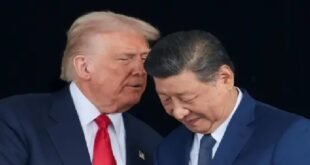By SJA Jafri + Bureau Report
 KABUL/ DOHA/ KARACHI/ ISLAMABAD: World’s second most Hippocratic country known as Australia that is not only known as anti-Islam and anti-Muslim state but also avowed as an immature, immoral, irresponsible, uneducated, abnormal, insincere, illiterate, uncivilized, selfish, opportunist and backward but self-declared modern republic just because of its regime’s policies, sources told PMI.
KABUL/ DOHA/ KARACHI/ ISLAMABAD: World’s second most Hippocratic country known as Australia that is not only known as anti-Islam and anti-Muslim state but also avowed as an immature, immoral, irresponsible, uneducated, abnormal, insincere, illiterate, uncivilized, selfish, opportunist and backward but self-declared modern republic just because of its regime’s policies, sources told PMI.
Sources further revealed that world mainly anti-Pakistan and anti-Islamic countries have repeatedly confirmed that there are continuous existence of Taliban in Pakistan across the country particularly in Karachi and Quetta and they have been kidnapping, torturing, murdering, abducting, forced-missing and beheading Pakistani Shia Muslims during over last thirty (30) years but Australia is the only country in the entire world that not only says that “there is no existence of Taliban in Pakistan” but also fights them those insist that neither the Taliban had existed in Pakistan since Zia-ul-Haq era but since the Afghan Jihad, a large numbers of Taliban if different shapes and getups have been existing in Pakistan and still existed.
The world’s most unaware and biased Case Officers, Immigration Authorities and other concerned officials even tribunals and courts of Australia have declined over 300 applications on the basis that  “there is no existence of Taliban in Pakistan now” hundreds of decisions while they also refer the Pakistan’s governments and agencies reports and press releases in this regards, sources added.
“there is no existence of Taliban in Pakistan now” hundreds of decisions while they also refer the Pakistan’s governments and agencies reports and press releases in this regards, sources added.
A comprehensive record of almost 300 Applicants even the copies of Case Officers’ decisions, victims’ interviews, verdicts & versions have already been collected by PMI during the last nine years while hundreds more wrong decisions have been composed while the decisions are being received in this regard.
According to the reports, the Taliban in Afghanistan have mediated a temporary ceasefire between Pakistan and Tehreek-e-Taliban Pakistan (TTP) following talks between the two sides in Kabul, an official said on Wednesday.
The TTP, the Pakistani Taliban, have carried out some of the bloodiest attacks inside Pakistan since 2007. It is not directly affiliated with the Afghan Taliban, but pledges allegiance to them.
“During the talks, in addition to significant progress on related issues, a temporary ceasefire was also agreed upon,” Taliban spokesman Zabihullah Mujahid said on Twitter, confirming the talks in Kabul.
 Pakistan carried out a number of operations against the TTP and was able to control the militancy in the country during the past few years but the terror group has resumed attacks against the Pakistani forces recently following the Taliban’s takeover of Kabul.
Pakistan carried out a number of operations against the TTP and was able to control the militancy in the country during the past few years but the terror group has resumed attacks against the Pakistani forces recently following the Taliban’s takeover of Kabul.
A TTP statement on Wednesday also confirmed that talks were underway in Kabul and that a ceasefire has been put in place till May 30.
It was not clear who was representing Pakistan’s government in the talks. Pakistan’s foreign office spokesman did not reply to Reuters’ request for comment.
Islamabad says the TTP has been able to find safe haven in Afghanistan over the years, a charge both the Taliban and the previous US-backed governments have denied.
Last year, the two sides had agreed to a ceasefire but talks failed. The talks, also held inside Afghanistan, broke down due to a disagreement over the release of TTP prisoners held by Pakistan, according to local media.
Earlier, the outlawed Tehreek-e-Taliban Pakistan (TTP) on Wednesday announced an extension in a ceasefire with the government of Pakistan as talks with the militant group continued in Afghanistan.
 In a statement shared with the media via WhatsApp, TTP spokesman Mohammad Khurasani said that the ceasefire would remain in place until May 30.
In a statement shared with the media via WhatsApp, TTP spokesman Mohammad Khurasani said that the ceasefire would remain in place until May 30.
“Talks are under way between the committees of the TTP and the government of Pakistan,” he said in the statement, adding that the Islamic Emirate of Afghanistan, the Afghan Taliban was mediating between the two sides.
Khurasani went on to say that a 32-member committee of the Mehsud tribe in South Waziristan and a 16-member committee from the Malakand division also held talks with the TTP on May 13 and 14.
“The committees called for a ceasefire by both sides in light of the ongoing talks. Therefore, keeping in view the demand, both sides have announced a ceasefire until May 30,” he said.
The Afghan Taliban also confirmed the talks in Kabul, with government spokesman Zabihullah Mujahid saying the Islamic Emirate played the role of a mediator.
In a series of tweets in Pashto, he reported “significant progress” in the talks and also shared that a ceasefire had been agreed upon.
 “The Islamic Emirate Afghanistan, in a good faith, is making efforts to take the process forward. We hope that both sides will be accommodating and show flexibility,” he said.
“The Islamic Emirate Afghanistan, in a good faith, is making efforts to take the process forward. We hope that both sides will be accommodating and show flexibility,” he said.
Dawn.com reached out to Pakistani officials for comment and is currently awaiting a response.
A Pakistani embassy source in Kabul confirmed the visit of the Pakistani delegation but remained tightlipped about the composition of the team and the details of the talks.
TTP attacks on Pakistani soil have of late witnessed an uptick.
The previous PTI government and the TTP had agreed to a month-long ceasefire to hold talks last year. However, the militant group had declined to extend the ceasefire after the one-month period ended, accusing the government of failing to honour the decisions reached earlier.
Earlier this month, AFP had reported that another ceasefire, agreed for the Eid period, had been extended until May 16 in order to hold peace talks. A TTP letter outlining the truce had told fighters “not to violate the decision taken by the central command”.
 Reports had also emerged about the release of two key TTP leaders, Muslim Khan and Mahmood Khan, and their subsequent handover to the Afghan Taliban. Both leaders were on the list of over 100 detainees, the release of whom is one of the group’s key demands.
Reports had also emerged about the release of two key TTP leaders, Muslim Khan and Mahmood Khan, and their subsequent handover to the Afghan Taliban. Both leaders were on the list of over 100 detainees, the release of whom is one of the group’s key demands.
However, the TTP spokesman did not comment on the matter when asked by Dawn.com. “I do not have any confirmed information about the prisoners,” Khurasani said.
Furthermore, the Taliban spokesman Zabihullah Mujahid has said that the issue of the Tehreek-e-Taliban Pakistan (TTP) is one that the Pakistan government must resolve, not Afghanistan.
Zabihullah Mujahid’s remarks came during an interview with Geo News on programme “Jirga”, aired on Saturday night. Show host Saleem Safi asked the spokesman if the Taliban will speak to the TTP to not engage in conflict with Pakistan. In response, Mujahid said: “The issue of the TTP is one that Pakistan will have to deal with, not Afghanistan. It is up to Pakistan, and Pakistani Ulema and religious figures, not the Taliban, to decide on the legitimacy or illegitimacy of their war and to formulate a strategy in response.”
 When asked how soon people can expect the formation of a government in Afghanistan, the spokesman said that full-fledged efforts are currently underway in this regard, but that some minor obstacles are causing a delay.
When asked how soon people can expect the formation of a government in Afghanistan, the spokesman said that full-fledged efforts are currently underway in this regard, but that some minor obstacles are causing a delay.
“First of all, entering Kabul all of a sudden and taking over governance like this was unanticipated. We desire to hold wide-ranging talks regarding the formation of a government, so that a strong government can be formed,” he said. Mujahid also indicated the Taliban’s desire for an “end to war”, and the “creation of such a system, with everyone’s input, that represents the wishes of the people”.
“We have made considerable progress in this regard, but work is still underway,” he said.
“Discussions are being held on all aspects of a government,” the spokesman said, adding that he hopes that the Taliban will be ready “within a few days” to make an announcement in this regard.
Mujahid noted that delay has caused hindrances in day-to-day operations and matters of trade and diplomacy, and so the Taliban have “engaged all their efforts in forming a government as soon as possible”.
Regarding talks with former Afghan president Hamid Karzai and former chief executive officer Dr Abdullah Abdullah, besides former vice presidents Yunus Qanuni and Abdul Rashid Dostum, the  Taliban spokesman said that their advice is being taken. He said that the Taliban wish for those to be part of the government who have the support of the people and enjoy popularity and will avoid the inclusion of people who were at the centre of conflict in the past.
Taliban spokesman said that their advice is being taken. He said that the Taliban wish for those to be part of the government who have the support of the people and enjoy popularity and will avoid the inclusion of people who were at the centre of conflict in the past.
“We are consulting all leaders present in Kabul. We are in touch with them, and their recommendations are important to us,” he added.
Mujahid said that the Taliban also wished for “new faces” to be part of the government. To a question on what each side has demanded of the other, the Taliban spokesman said that the group will move forward keeping in view the input given by the political leaders and will take measures in light of the same.
When Saleem Safi asked what the future holds for Rashid Dostum if the view is for the inclusion of only acceptable figures, Mujahid said: “The people who were part of the government in the last 20 years have worked for Afghanistan to some extent but do not enjoy the overwhelming support of the people.”
“We wish to begin a new chapter and include people who do not only enjoy popular support, but are deserving of being the people’s representatives. But this does not in any way mean that all the past leaders will be sidelined. We will routinely consult them and seek their advice,” he told Jirga.
 Pressmediaofindia
Pressmediaofindia




